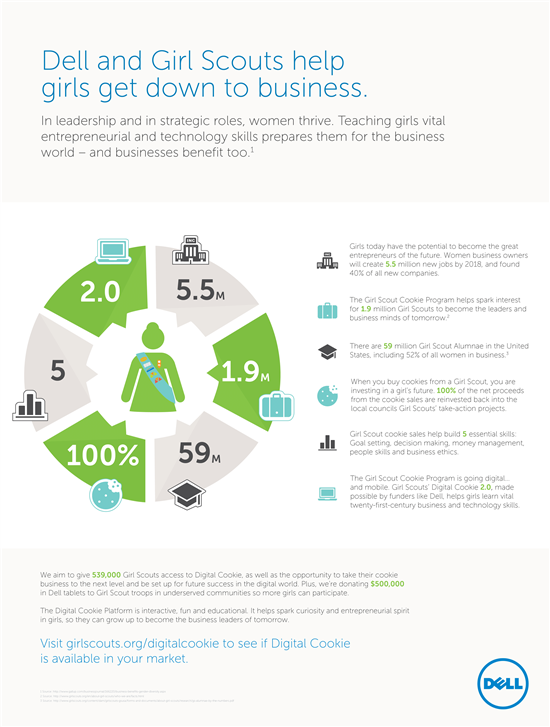By Heather Wilson
With hundreds of millions of dollars in cookie sales each year, Girl Scouts across the country can teach us all a thing or two about what it means to be entrepreneurial.
And on the other side of the world, students with the Learning Links Foundation can share what it means to have the skills for a more promising career—aspart of India’s growing youth population.
The Girl Scouts of the U.S.A and Learning Links Foundation of India are two nonprofits leading in entrepreneurial education, enabling young minds to not only start companies but also to think creatively and ambitiously.
Both are working with Dell and using its donated technology to strengthen the roles they play in children’s lives.
Education and technology experts agree—entrepreneurs and small businesses are the engines of our global economy. But research shows only a small proportion of students around the world have access to entrepreneurship education.
Dell is working to change this. Its Youth Learning program is focused on increasing young people’s access to technology to prepare them for success in a 21st century, digital world.
“Entrepreneurs and small businesses are the engines of our global economy,” said Trisa Thompson, chief responsibility officer at Dell. “It is in all of our best interests to nurture the entrepreneurial spirit from a young age and support the digital literacy skills required to thrive in a connected world.”
Dr. Gene Coulson, executive director of the Consortium for Entrepreneurship Education, says school systems across the United States are headed toward a day when every student will benefit from standards that include entrepreneurship competencies.
“We’re not at a point of national entrepreneurship curriculum, but we are working in the right direction,” Dr. Coulson says. “There are a lot of small programs that one school or a small region initiates. We see those popping up all the time.”
Coulson helpsU.S. educators to teach students to become self-sufficient by being prepared to create their own business opportunity. He points to organizations like the Girl Scouts—and Junior Achievements and Lemonade Day, both partners of the Consortium, for cultivating entrepreneurial skills that may not be taught in the usual school day.
With the right entrepreneurial skills, kids can do big things. Sheila Narayanan, Girl Scouts of the U.S.A.’s Chief Digital Girl Experience Executive, says that every year over a million Girl Scouts work together to sell so many cookies that the Girl Scouts would be the number three 3 cookie company in the country, if it were a private corporation.
These fast learners do so by dedicating time, setting big goals, documenting a plan, and working as a team. The Girl Scout cookie sales program is the largest girl-led business in the world and more than one half of all businesswomen in the United States are Girl Scouts alumnae.
“Much like Girl Scouts, entrepreneurialism is about an outlook on life that says “I can”, even when the world says “you can’t.” It also means finding ways to give back. Our goal is to develop girls of courage, confidence and character who make the world a better place,” says Narayanan.
Social entrepreneurship doesn’t just sound nice – it’s a growing career field.
Social good engineer Krista Donaldson is a former Girl Scout—and the woman behind Design Revolution or D-Rev, a San Francisco-basedorganization geared to improve the lives of the world’s poorest people—those living on four dollars or less a day. D-Rev’s products include an $80 prosthetic knee and a phototherapy device to treat infants with severe jaundice.
When it came to building her first prototype—a model bridge for a Girl Scouts badge—mom and dad observed as Donaldson chose paper for her construction material. “And that did not go well,” she says. “They let me figure that out. I still enjoyed making it. I was one of those mega badge nerds.”
Now, Donaldson and her team create successful products that are changing the world through a series of rapid prototyping, made possible by technology—some donated by Dell. In India and globally, D-Rev’s affordable prosthetics remobilize low-income amputees so they are able to ride a bike, walk to school, or return to work.
Learning Links Foundation Chairperson Dr. Anjlee Prakash knows the struggles of her rapidly growing country well—where over 1.2 billion people compete for jobs. She and her colleagues are leveraging Dell tablets and cloud computing to provide educational programs to over 72,000 students across India, many with parents who bring in less than $100 a month.
“Parents share how their children have learned to manage their limited pocket money more effectively while even setting small financial goals,” Dr. Prakash says. “Teachers see students coming up with useful ideas to solve different community issues such as water conservation.”
In the United States, Girl Scouts are now using their Digital Cookie 2.0 platform to learn about e-commerce while exploring ways to help others by investing their earnings back into their communities.
Dell has supported the Girl Scouts since 2010, as one of its Youth Learning Partners. Recently, Dell strengthened its support by providing funding for the Girl Scouts Digital Cookie 2.0 platform.
“Digital Cookie plays a crucial role in bolstering these traditional door-to-door sales through the Digital Cookie mobile app, which allows girls to take orders, process payments, and take shipping requests from a smart device,” Narayanan says.
In addition to helping fund the development of Digital Cookie 2.0, Dell is also donating tablets to Girl Scout troops in underserved communities.
Through strategic giving, Dell has helped 1.4 million underserved youth gain access to technology and education, almost half way to our goal of benefiting 3 million by 2020.
To learn about other ways Dell’s Legacy of Good goals are paying off for customers, communities and the planet, visit www.dell.com/legacyofgoodupdate.
Dell is committed to using technology to improve the lives of young people. Learn more at dell.com/youthlearning
